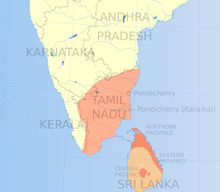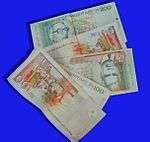Tamil Mauritians
Tamil Mauritians are the descendants of Tamil people who migrated from South India to the island of Mauritius.[1]
| Total population | |
|---|---|
| 10–15% of Indo-Mauritians | |
| Regions with significant populations | |
| Flacq district, plaines wiilhems district, savanne district and throughout mauritius in small numbers | |
| Languages | |
| Tamil, Mauritian Creole, Bhojpuri-Hindustani, English, French | |
| Religion | |
| Predominantly Hinduism to a smaller extent Christianity and Islam | |
| Related ethnic groups | |
| Tamil diaspora, Malayalees, Telugu people, Tulu people, Kannada people, Tamil South Africans, Tamil Malaysian, Singapore Tamils, Tamil Guyanese, Tamil Trinidadian and Tobagonian, South Indians in Fiji, Dravidians |
| Part of a series on |
| Tamils |
|---|
 |
|
|
People
|
Tamil Australians, French Tamils, British Tamils, Tamil Italians, Tamil Indonesians, Tamil Canadians, Tamil Americans, Tamil South Africans, Myanmar Tamils, Tamil Mauritians, Tamil Germans, Tamil Pakistanis, Tamil Seychellois, Tamil New Zealanders, Swiss Tamils, Dutch Tamils |
|
Politics
|
|
|
History
The first batch of Tamil immigrants were craftsmen and tradesmen who arrived in small numbers after 1727 when Isle de France (Mauritius) was under the administration of France and French East India Company.[2][3] A larger number of immigrants from Tamil Nadu arrived during British rule and after abolition of slavery from 1835 to serve as labourers on the sugar cane plantations.[4][5] From 1834 to 1924 out of the estimated 458,000 indentured labourers who came from all over India to Mauritius, around 114,500 came from the Presidency of Madras. Tamil indentured labourers made up 25% of the total indentured population. From around 1850 Tamil was taught in some schools such as Royal College Curepipe.[6]
Modern times
Around 15 percent of Indo-Mauritians are Tamils. Tamils make up 10 percent of the island's total population of around 1.3 Million. They account for 130,000 of the Mauritian population. The community includes a Hindu majority (86%), about 12% of Tamils are Christians (largely Roman Catholic) and 2% are Muslims.[7][8] Of this number, around 7000 people reported that they spoke Tamil.[8][9] A large population of the Tamils in Mauritius live in Rose-Hill, Flacq and Savanne.
Language
Most Tamil Mauritians can read and write Tamil to some extent, but very few can speak it well. Most speak Mauritian Creole, which include many Tamil words.[10] A Tamil magazine Pathirikai and a Tamil radio station Onex FM exist in Mauritius. Most cultural aspects and rituals can be seen in full-fledged manner. Around a 100 schools teach Tamil as a mother tongue subject. It can also be learnt at university level. A Tamil conference was held here.
Festivals
Thaipusam, the Tamil Hindu festival, is a national holiday in Mauritius at the beginning of every year and is celebrated in various temples. Murugan temples are common and various public places bear Tamil names such as Coromandel near Port Louis (derived from Cholamandalam), Alepo Street, Velore Street, Madras Street, and others.[11][12]

See also
References
- Sangeelee, M. "A Brief History of the Tamils of Mauritius". 1966 International Tamil Conference - Seminar Kuala Lumpur, Malaysia. Retrieved 2020-08-16.
- "Mauritius: European settlement and the slave economy (1638-1835)". African Democracy Encyclopaedia Project. EISA. Retrieved 2009-09-15.
- The Murukan cult in Mauritius by Khesaven Sornum (2001)
- "History of the Tamil Diaspora by V. Sivasupramaniam", murugan.org
- Mauritius Government
- Makhan-Boodhoo, Sarita. "The Tamil Presence in Mauritius". Mauritius Times. Retrieved 2015-11-08.
- Raj, T.V. Antony. "Tamil on Mauritian Currency". www.tvaraj.com. Retrieved 2014-10-07.
- Republic of Mauritius
- Republic - Resident population by geographical location and religious group
- Mo Koz Kreol
- "Fascinating Story of How The Coromandel Coast Got Its Name". Better India. Retrieved 2020-08-16.
- Makhan-Boodhoo, Sarita. "The Tamil Presence in Mauritius". Mauritius Times. Retrieved 2015-11-08.